
Miranda
Scope & Guideline
Unlocking insights from diverse perspectives.
Introduction
Aims and Scopes
- Interdisciplinary Analysis of Arts and Culture:
The journal emphasizes a multidisciplinary approach, bringing together perspectives from visual arts, literature, theater, and music. This focus allows for a comprehensive examination of cultural phenomena and their implications. - Exploration of Historical Contexts:
Many papers delve into historical narratives, analyzing how past events shape contemporary artistic expressions and cultural identities. This historical lens contributes to a deeper understanding of current societal issues. - Critical Engagement with Media and Performance:
The journal frequently addresses the dynamics of performance and media, focusing on how these forms influence public perception and cultural discourse. This includes discussions on theater, film, and digital performances. - Cultural Critique and Identity Studies:
A significant portion of the research engages with themes of identity, including race, gender, and sexuality, often critiquing representation and power structures within cultural texts. - Reflections on Globalization and Transnationalism:
The journal examines the effects of globalization on cultural production, highlighting transnational collaborations and the exchange of ideas across borders.
Trending and Emerging
- Digital and Virtual Performance:
With the rise of digital media, the journal has increasingly published works examining digital performances and their impact on traditional forms of theater and art, especially in the context of the COVID-19 pandemic. - Ecocriticism and Environmental Studies:
Emerging themes around ecocriticism and the representation of nature in literature and art are gaining traction, reflecting a growing concern for environmental issues and sustainability within cultural discourse. - Exploration of Gender and Sexuality:
There is a notable increase in papers addressing gender studies and queer theory, exploring how these identities are represented and constructed in various cultural texts. - Cultural Memory and Trauma Studies:
Research focused on cultural memory, particularly regarding historical traumas, is becoming more prevalent, highlighting how art and literature engage with collective memories and societal healing. - Intersections of Race and Representation:
An emerging theme is the critical examination of race and representation in media, with a surge in studies addressing how racial identities are portrayed and perceived in contemporary art and literature.
Declining or Waning
- Traditional Art Historical Approaches:
There has been a noticeable decrease in papers strictly adhering to traditional art historical methodologies. Instead, the journal has shifted towards more contemporary and interdisciplinary approaches, leaving classical analyses less prominent. - Focus on National Narratives:
There is a declining emphasis on nationalistic narratives in art and literature, with fewer papers exploring the significance of national identity in cultural production. The journal seems to be moving towards more global and transnational perspectives. - Formalism in Literary Criticism:
The formalist critique, which focuses on the structure and form of literary works, appears to be less prevalent. Recent issues have favored thematic and contextual analyses over strict formalist interpretations. - Historical Biographies of Artists:
Papers dedicated to biographical accounts of historical figures in art and literature have decreased, as the journal's scope broadens to include more critical and theoretical discussions. - Single-Discipline Studies:
There is a waning interest in studies that focus exclusively on one discipline. The journal is increasingly promoting interdisciplinary research that connects various fields, reflecting a broader academic trend.
Similar Journals
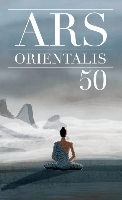
ARS Orientalis
Bridging Tradition and Modernity in ScholarshipARS Orientalis is a distinguished academic journal published by the Smithsonian Institution's Freer Gallery of Art, specializing in the fields of archaeology, cultural studies, and the visual and performing arts. With an ISSN of 0571-1371, this journal contributes significantly to scholarly discourse, having established a robust timeline of publication since its inception, notably from 2001 to 2006, 2010 to 2012, 2014 to 2017, and resuming again from 2022 to 2023. Though currently not open access, it maintains a respectable standing in the academic community with a categorization into Q3 quartiles across several disciplines, highlighting its relevance amid rigorous scholarly evaluation. The journal is particularly valuable for researchers, professionals, and students who seek to explore interdisciplinary connections within its scope. Situated in the United States, it aims to disseminate insightful research that bridges the gap between traditional scholarship and contemporary studies in visual culture and archaeological findings.
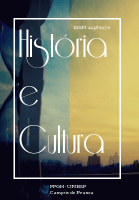
Historia e Cultura
Exploring the Tapestry of Humanity's Past and PresentHistoria e Cultura is a distinguished open-access journal focusing on the dynamic and multifaceted exploration of history and culture within the context of the Humanities. Published by the UNIV ESTADUAL PAULISTA JULIO MESQUITA FILHO, FAC CIENCIAS HUMANAS & SOCIAIS, the journal serves as a vital resource for researchers, professionals, and students engaged in the fields of historical research and cultural studies. Since transitioning to open access in 2012, Historia e Cultura aims to democratize knowledge by providing free, unrestricted access to high-quality articles that foster scholarly exchange and innovation. Although the specific impact factor remains undisclosed, the journal is dedicated to contributing to the academic discourse through rigorous peer-reviewed research. Situated in Brazil, Historia e Cultura is well-positioned to address both local and global issues, encouraging critical engagement with cultural heritage and identity. Researchers and scholars are invited to submit their work, ensuring that diverse perspectives are represented in the study of our shared history.
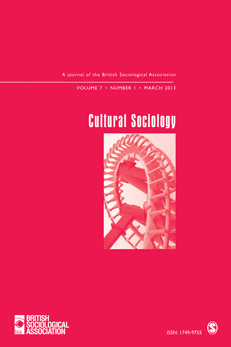
Cultural Sociology
Exploring the Intersections of Culture and SocietyCultural Sociology is a leading academic journal published by SAGE Publications Ltd, aimed at advancing the field of cultural studies and social sciences. Established in 2007 and converging until 2024, this UK-based journal boasts a remarkable Q1 ranking in both Cultural Studies and Miscellaneous Social Sciences as of 2023, solidifying its reputation as a significant contributor to scholarly discourse. With a Scopus rank of #83 out of 1304 in its primary field, Cultural Sociology offers an important platform for researchers, professionals, and students to explore the intricate relationships between culture, society, and identity. Although it is not currently Open Access, this journal is dedicated to fostering interdisciplinary dialogue and rigorous research, making it an essential resource for those seeking to engage deeply with cultural phenomena and social dynamics.

Open Library of Humanities
Fostering Interdisciplinary Dialogue for a Richer UnderstandingThe Open Library of Humanities, a premier platform established in 2015 and based in the United Kingdom, elevates the discourse in the fields of Anthropology, Arts and Humanities, Cultural Studies, and Sociology and Political Science. Published by OPEN LIBRARY OF HUMANITIES, this open access journal provides a prominently accessible space for scholars and researchers to disseminate their findings and contribute to a diverse range of academic conversations. With an impressive Scopus ranking that reflects its influence—ranking in the 87th percentile in General Arts and Humanities and in the 80th percentile for Cultural Studies—the journal is recognized for publishing high-quality research that addresses significant and contemporary issues within its scope. By embracing a multidisciplinary approach, the Open Library of Humanities fosters interdisciplinary dialogue and encourages innovative research dissemination practices. Scholars, students, and practitioners are invited to engage with the latest developments and theoretical insights that enrich our understanding of the human experience.
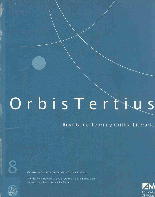
Orbis Tertius
Connecting Ideas, Cultivating ExcellenceOrbis Tertius is an esteemed academic journal published by the National University of La Plata, Faculty of Humanities and Educational Sciences, dedicated to the multifaceted fields of humanities, social sciences, and educational research. Since its inception in 1996, this Open Access journal has been committed to facilitating the dissemination of scholarly work that fosters critical thinking and dialogue amongst researchers and practitioners from diverse backgrounds. With a focus on innovative methodologies and interdisciplinary approaches, Orbis Tertius serves as a platform for high-quality research that enriches our understanding of complex societal issues. The journal’s accessibility ensures that valuable insights are available to a global audience, making it a vital resource for academics, students, and professionals striving for excellence in their respective fields. Located in La Plata, Argentina, it invites contributions that reflect the dynamic nature of contemporary humanities and educational practices.

Valenciana
Connecting emerging voices with global perspectives.Valenciana is an esteemed, peer-reviewed journal published by the University of Guanajuato, dedicated to advancing scholarly discourse in the fields of humanities and social sciences. Since its inception in 2008, this Open Access journal has facilitated unrestricted access to high-quality research, fostering collaboration and innovation among researchers, professionals, and students. With an ISSN of 2007-2538 and an E-ISSN of 2448-7295, Valenciana is committed to publishing original research, reviews, and theoretical contributions that illuminate contemporary issues and cultural phenomena. The journal not only serves as a platform for emerging voices in academia but also enhances its visibility in the global research landscape, driving interdisciplinary dialogue and engagement. Situated in Guanajuato, Mexico, Valenciana embraces the rich academic heritage of the region while also appealing to a broader audience, making it a vital resource for those seeking to explore new ideas and perspectives in their respective fields.

Dixit
Bridging Cultures and Ideas in AcademiaDixit is a respected academic journal published by Universidad Católica del Uruguay, Facultad de Ciencias Humanas, primarily focusing on the fields of humanities and social sciences. With an ISSN of 1688-3497 and an E-ISSN of 0797-3691, this journal has been a fully Open Access publication since 2007, enabling free and unrestricted access to its high-quality research. It serves as a vital platform for scholars, researchers, and students to explore innovative ideas and disseminate valuable findings that contribute to the understanding of human experiences across various contexts. The journal's commitment to open access not only promotes knowledge sharing but also facilitates cross-disciplinary dialogue, making it an essential resource for anyone seeking to deepen their insights into the humanities. By fostering collaboration and engaging the academic community, Dixit plays a pivotal role in advancing scholarly discourse in Latin America and beyond.
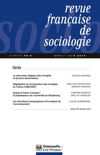
REVUE FRANCAISE DE SOCIOLOGIE
Fostering Critical Discourse in Sociology and Political ScienceREVUE FRANCAISE DE SOCIOLOGIE, published by PRESSES SCIENCES PO, is a prominent journal dedicated to the fields of sociology and political science, characterized by its rich historical contributions since its inception in 1977. With a commitment to scholarly excellence, the journal currently holds a Q3 ranking in its category for 2023, illustrating its relevance within the academic community. This esteemed publication offers a platform for innovative research and critical discourse, catering to both established scholars and emerging voices in the social sciences. The journal seeks to explore contemporary sociological issues through rigorous empirical analysis and theoretical reflection, fostering a deeper understanding of socio-political dynamics. Although it does not offer Open Access options, REVUE FRANCAISE DE SOCIOLOGIE remains a vital resource for researchers and students alike, providing access to cutting-edge scholarship that shapes the conversation around societal structures and political frameworks.
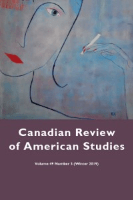
CANADIAN REVIEW OF AMERICAN STUDIES
Bridging Canadian Perspectives with American StudiesCanadian Review of American Studies, published by University of Toronto Press Inc, stands as a vital scholarly outlet in the fields of American studies, literature, cultural studies, and history. With its origins tracing back to 1973, this journal provides a platform for innovative research and critical discourse, appealing to a wide audience of researchers, professionals, and students alike. While currently indexed in Scopus with quartile rankings highlighting its position in various categories—Q4 in Cultural Studies, History, and Literature and Literary Theory—the journal embraces a robust pursuit of knowledge that examines the intricate layers of American culture and its global intersections. Although it does not offer open access, the journal's commitment to academic rigor ensures its contributions are indispensable for understanding the complex narratives that shape American identity. As it continuously evolves, the Canadian Review of American Studies serves as an essential resource for anyone engaged in this dynamic and interdisciplinary field.

Selcuk Universitesi Edebiyat Fakultesi Dergisi-Selcuk University Journal of Faculty of Letters
Advancing Knowledge in Humanities and Social SciencesWelcome to the Selcuk University Journal of Faculty of Letters, a prominent scholarly publication dedicated to advancing the fields of humanities and social sciences. Published by Selcuk University, Faculty of Letters, this journal features innovative research and critical studies across various literary, linguistic, and cultural disciplines. With an Open Access model since 1981, the journal ensures that knowledge is freely accessible, fostering a collaborative academic environment for researchers, professionals, and students alike. The journal's commitment to scholarly excellence is reflected in its rigorous review process and its aim to elevate discourse within the humanities. Join a vibrant community through the Selcuk University Journal of Faculty of Letters and contribute to the shared pursuit of knowledge and understanding.